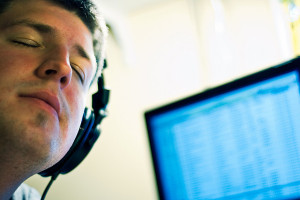4 ways to use technology to de-stress
 As students, faculty and staff head into finals week, it is easy to be caught up in the stress of completing the semester. Since stress reduces work efficiency and productivity, it is important to remain calm and cool while finishing your work. Despite its reputation as a distraction during finals time, technology can actually help you de-stress.
As students, faculty and staff head into finals week, it is easy to be caught up in the stress of completing the semester. Since stress reduces work efficiency and productivity, it is important to remain calm and cool while finishing your work. Despite its reputation as a distraction during finals time, technology can actually help you de-stress.
Jenn Grimmett, who works in Media Services, knows firsthand how technology can be used in the process of relieving stress. She uses self-made dance videos to calm and clear her mind. Grimmett believes that sometimes, we forget how impactful stress is on our daily lives.
“If you look at how stress translates to your health, you can interrupt that stress, so that pressure doesn’t go up,” Grimmett said. “It leaves you with more of a clear mind, so you come to the table with an open mind and be ready to have conversations. People often forget how stress can have a direct effect on the way you can process information. Interruptions can kick-start your thinking into a different direction.”
Here are some ways to use technology to relieve stress:
Breathing
How often do we hear family or friends say “take a deep breath” when we’re stressed? That’s because focused breathing is one of the best ways to rid the body of stress. Breathe2Relax (FREE, available for iPhone & Andriod) is one app that guides you through a number of breathing exercises meant to soothe symptoms of a panic attack. Universal Breathing (FREE, available for iPhone & Andriod) also utilizes focused breathing exercises for relaxation, especially for preventing panic attacks before they happen.
Yoga/Stretching
Many people turn to yoga as a way to relieve tension and stress throughout the body, so there are a number of different apps to help with those routines. Daily Yoga (FREE, available for iPhone & Andriod) guides you through customized yoga exercises based on your skill level, fitness goals and time constraints. This is great no matter if you need a longer, more fulfilling experience or need a five-minute stretch break from your work. Pocket Yoga ($2.99, available for iPhone & Andriod) will play music and guide you through a routine that can choose based on intensity or even what environment you’re in. Yoga for Insomnia ($4.99, available for iPhone & Andriod) keeps the next topic, sleep, in mind, by leading you through a yoga routine meant to relax you for bedtime.
Sleep
At this point, we all know how important a good night’s sleep is to reducing stress. A number of apps help ease the process. For example. Deep Sleep with Andrew Johnson ($2.99, available for iPhone & Android) is an application that talks you into a more peaceful place before you fall asleep. Relax Melodies (FREE, available for iPhone & Andriod) allows users to choose over 50 sounds to lull them to sleep, with a timer setting to turn the sounds off at a certain point. The app Sleep Time (FREE, available for iPhone & Android) tracks your sleep cycle, from how long it took to fall asleep to how efficient your sleep cycle was, in order help you get into a better sleep pattern.
Dance
Dance is an outlet to release stress in a way that’s both positive and constructive. So, play it loud and dance it out. WikiHow outlines steps through which you can dance specifically to relieve stress. Use your own music and make a playlist to fit your dance style. Or use the app 8tracks (FREE, available for iPhone & Android), which allows you to choose a playlist of music based on the mood you’re in.
Jenn Grimmett brings dancing with technology to the next level: she makes dance videos. She doesn’t share them with anyone, but the fun she has filming helps her relieve her stress.
How do you use technology de-stress? Tell us in the comments below!
Image via Flickr user William Brawley / CC BY 2.0
 Follow
Follow


Hi Casey ! Thank you for your stress free tips. I would like to share some tips to reduce your stress: You have to keep balance your daily scheduled to control your stress and also manage responsibilities; Accomplish goals and have time for rest and relaxation requires that you practice time management skills. You have to set your specific goal to improve your mood and help to reduce stress. You have to avoid procrastination. Keep quality of your work, quality of your sleep and quality of your mood.